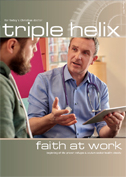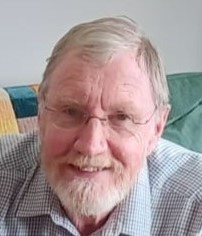When I joined CMF as a medical student in the early 1970s, the standard advice then to aspiring young Christian doctors was to get as far as possible in terms of seniority and prestige in the profession. The idea was you would be better able to exert Christian influence. This advice is laudable in many ways. Indeed, as a young doctor I became acquainted with some high-profile senior Christian doctors who were exemplary Christian role models, fulfilling their calling with graciousness, compassion and humility.
However, I was aware of others who, whilst enjoying similar levels of seniority and influence, did not display the same characteristics. They were savvy and experienced in the ways of the NHS workplace, but it seemed that they remained 'babes in the faith'. Their pursuit of professional excellence and prestige had been at the expense of Christian growth and character.
This observation made early on in my own journey as a Christian medic made me wonder if the advice referred to above really was as wise as it initially seems to sound. Further, it has led me to question the whole issue of how Christians approach the issue of power. It is easy to be sucked into what is actually a worldly perspective that says 'grab whatever power you can so you can use it for good'. Contrast this with Paul's words in 1 Corinthians:
But God chose the foolish things of the world to shame the wise; God chose the weak things of the world to shame the strong. God chose the lowly things of this world and the despised things - and the things that are not - to nullify the things that are, so that no one may boast before him. (1)
This is demonstrated in the life and ministry of Jesus. Although King of the Universe and ruling at the right hand of God the Father, he was born not in an emperor's palace but in a stable, his birth was announced to a group of Middle Eastern shepherds, social outcasts at that time. His earthly ministry focused on helping poor, marginalised and excluded people. He frequently challenged rulers, both religious and secular. He changed the hearts and lives of those who welcomed his loving touch and proclaimed that this is what the Kingdom of God is like. Finally, he submitted to an appalling criminal's death and the mocking of most who watched it. His resurrection showed that evil had been overcome not by power and force but by his love and sacrifice.
All this should prompt Christians to a radically different understanding of power and prestige from worldly values. So often in history it has been small, unobtrusive and even despised Christian people and groups who have been used by God to confront and change the unjust, oppressive and wrong structures; powers keeping people in darkness. In his book, The Prophetic Imagination, (2) Walter Brueggemann argues that as soon as God's people are identified with the power structures of the world, they lose their prophetic voice and role and become ineffective in their witness.
So what about Christian healthcare professionals? Does this mean that we should avoid positions of seniority and influence in order to preserve our Christian identity? Well, I think the answer may sometimes be yes. Our ambition should be to demonstrate Christ-like character in whatever position we find ourselves; not being over-concerned with how prestigious or otherwise it may be. Some of us may be called to significant high-profile senior roles. We should not undertake them unless we are sure that we can really trust God for the wisdom, humility and courage to fulfil them without compromising our Christian faith and witness.
Sadly, there often seems to be a curious blindness about misuse of power in Christian circles, in a way that there would not be about other sinful behaviour (sexual immorality, for example). I have lost count of the number of people I have listened to over the years who were wounded by the abuse of power by church leaders or leaders of Christian organisations. Sadly, this goes largely unchallenged. It does indeed seem to be true that 'power corrupts'. Christians are far from immune to its pull.
James, quoting Proverbs, reminds us: 'That is why Scripture says: "God opposes the proud but shows favour to the humble."' (3) Being a doctor is in itself a powerful position. We have some power over the lives of patients and perhaps their relatives. We have influence with nurses, paramedics and other colleagues. We may, as we progress in the profession, have power on committees and working groups in institutions. It can extend to the careers of juniors, trainees and medical students. So we always need to take care to be humble and compassionate with whatever power we have, remembering who it is that we are serving. His example of selfless loving sacrifice used the weak and despised things of the earth to shame the strong.
'Make it your ambition to lead a quiet life: you should mind your own business and work with your hands', says Paul in 1 Thessalonians. (4) Here is an exhortation to unostentatious, conscientious pursuit of whatever work we may be called to, unconcerned with gaining power and influence. Do we want respectability, prestige and recognition in our profession? Or do we want to be a radical disciple - content to work at the margins, challenging the status quo where necessary, working for God's Kingdom?
As the psalmist put it, 'I would rather be a door-keeper in the house of my God than dwell in the tents of the wicked'. (5) Christian ambition is about desiring to be more like Christ in our character, actions and words, not seeking power and prestige in our profession or anywhere else.
Huw Morgan is a retired GP involved in international training and based in Abergavenny.
However, I was aware of others who, whilst enjoying similar levels of seniority and influence, did not display the same characteristics. They were savvy and experienced in the ways of the NHS workplace, but it seemed that they remained 'babes in the faith'. Their pursuit of professional excellence and prestige had been at the expense of Christian growth and character.
This observation made early on in my own journey as a Christian medic made me wonder if the advice referred to above really was as wise as it initially seems to sound. Further, it has led me to question the whole issue of how Christians approach the issue of power. It is easy to be sucked into what is actually a worldly perspective that says 'grab whatever power you can so you can use it for good'. Contrast this with Paul's words in 1 Corinthians:
But God chose the foolish things of the world to shame the wise; God chose the weak things of the world to shame the strong. God chose the lowly things of this world and the despised things - and the things that are not - to nullify the things that are, so that no one may boast before him. (1)
This is demonstrated in the life and ministry of Jesus. Although King of the Universe and ruling at the right hand of God the Father, he was born not in an emperor's palace but in a stable, his birth was announced to a group of Middle Eastern shepherds, social outcasts at that time. His earthly ministry focused on helping poor, marginalised and excluded people. He frequently challenged rulers, both religious and secular. He changed the hearts and lives of those who welcomed his loving touch and proclaimed that this is what the Kingdom of God is like. Finally, he submitted to an appalling criminal's death and the mocking of most who watched it. His resurrection showed that evil had been overcome not by power and force but by his love and sacrifice.
All this should prompt Christians to a radically different understanding of power and prestige from worldly values. So often in history it has been small, unobtrusive and even despised Christian people and groups who have been used by God to confront and change the unjust, oppressive and wrong structures; powers keeping people in darkness. In his book, The Prophetic Imagination, (2) Walter Brueggemann argues that as soon as God's people are identified with the power structures of the world, they lose their prophetic voice and role and become ineffective in their witness.
So what about Christian healthcare professionals? Does this mean that we should avoid positions of seniority and influence in order to preserve our Christian identity? Well, I think the answer may sometimes be yes. Our ambition should be to demonstrate Christ-like character in whatever position we find ourselves; not being over-concerned with how prestigious or otherwise it may be. Some of us may be called to significant high-profile senior roles. We should not undertake them unless we are sure that we can really trust God for the wisdom, humility and courage to fulfil them without compromising our Christian faith and witness.
Sadly, there often seems to be a curious blindness about misuse of power in Christian circles, in a way that there would not be about other sinful behaviour (sexual immorality, for example). I have lost count of the number of people I have listened to over the years who were wounded by the abuse of power by church leaders or leaders of Christian organisations. Sadly, this goes largely unchallenged. It does indeed seem to be true that 'power corrupts'. Christians are far from immune to its pull.
James, quoting Proverbs, reminds us: 'That is why Scripture says: "God opposes the proud but shows favour to the humble."' (3) Being a doctor is in itself a powerful position. We have some power over the lives of patients and perhaps their relatives. We have influence with nurses, paramedics and other colleagues. We may, as we progress in the profession, have power on committees and working groups in institutions. It can extend to the careers of juniors, trainees and medical students. So we always need to take care to be humble and compassionate with whatever power we have, remembering who it is that we are serving. His example of selfless loving sacrifice used the weak and despised things of the earth to shame the strong.
'Make it your ambition to lead a quiet life: you should mind your own business and work with your hands', says Paul in 1 Thessalonians. (4) Here is an exhortation to unostentatious, conscientious pursuit of whatever work we may be called to, unconcerned with gaining power and influence. Do we want respectability, prestige and recognition in our profession? Or do we want to be a radical disciple - content to work at the margins, challenging the status quo where necessary, working for God's Kingdom?
As the psalmist put it, 'I would rather be a door-keeper in the house of my God than dwell in the tents of the wicked'. (5) Christian ambition is about desiring to be more like Christ in our character, actions and words, not seeking power and prestige in our profession or anywhere else.
Huw Morgan is a retired GP involved in international training and based in Abergavenny.
































